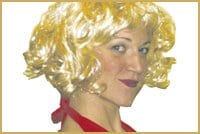According to the People’s Almanac, the first woman to place a “Lonely Hearts” advertisement was Helen Morrison who, in 1727, took out an ad in the Manchester Weekly Journal.
Shortly after the lovelorn ad ran, Manchester’s mayor committed Morrison to a lunatic asylum for four weeks.
In the ensuing centuries, the search for love has continued in ever-evolving ways, morphing from newspaper ads to speed dating to webcams and beyond.
Since Superdyke.com’s debut in 2001, for example, it has flourished to over 7,000 members with more than half a million messages exchanged, resulting in everything from flirting to marriage, boasts its founder, local website designer Michelle Walker.
Today, the online lesbian dating world contains more than its share of humour, heartache and, of course, a healthy percentage of dyke drama for good measure. Sound ripe for satire? You betcha.
Enter Karen White, co-founder of BC’s Leaping Thespians theatre company and obvious matriarch of the group.
Sitting at an East Van coffee joint surrounded by the actors and co-writers of her current piece, Women 4 Women: A Play in Cyberspace, she appears relaxed and eager to talk about her work.
White, who has been writing, directing and producing pieces under the Leaping Thespians name for 15 years throughout BC, has produced and directed a total of four plays in town. From 2001’s Oldest Living, to 2003’s quirky Murder at the Karaoke Contest, to the emotional two-actor Origin of the Species in 2004, the group has put on shows nearly annually since year one.
According to White, her company doesn’t have a mandate per se, just deep convictions.
“I like to do work by women and work with a cast that is only women. I’m not really interested in putting the time into a play unless it has lesbian content, because I think that there’s enough of the other stuff out there.”
As for the current production, White says she’s been thinking about the topic of cyber-dating for almost six years. “When people go onto the internet, they can be who they aren’t, pretend as long as they want. I just started percolating about that-are you just falling in love with this thing you’ve manufactured in your mind? What ‘makes’ chemistry? Do you have to see the person to have chemistry?”
Leigh Burrows-whose character Lucy is a queer stripper in the play-says internet dating has its downfalls. She recently had a two-year relationship that was primarily based online.
“You can hide yourself behind your words,” she says. “It can take an hour to write, but the person on the other side doesn’t know how much you edited and re-edited yourself. The relationship kept up the mystery, but we hid behind webcams and e-mails.”
For fellow Thespian Jacqueline Becher, internet dating lacks “that animal magnetism.”
“For me, there’s an ‘x’ factor,” she explains. “We like to think that we’re not that judgmental, but if we’re not physically attracted to them, it can’t work.”
Taylor Stutchbury-whose character Eva is the player of the group-dipped her toes into the pool of internet dating as well to prepare for her role. “I had just gotten out of a relationship, started rehearsals for this play and got a new computer when it was all happening,” she recalls. She promptly joined Superdyke and Gaydargirls.
The actors’ experiences all unquestionably contributed to the play at hand, which they all wrote together. The premise is that four women find themselves logging onto a lesbian dating site looking for love. Intrigue and desire build via e-mail, messaging and webcam to the point that the women can’t hold back from meeting each other-at which point ‘real life’ takes over, emotions flare and sparks fly.
Writing the play together was an incredibly organic experience, the Thespians say. “The writing process involves wine,” laughs Burrows. “Once a week we would get together and it just fell into a play.”
Roughly 50 weeks of weekly writing meetings and 160 hours of rehearsal later, Women 4 Women is set to launch Mar 7 at the Playwrights Theatre Centre on Granville Island.
Three of its five nights will be fundraisers (one for Little Sister’s, one for the Vancouver Dyke March and one for Team Vancouver), even though the actors won’t receive wages for their work.
“All we care about is breaking even,” explains White, “because if we do that, we can finance the next play. I’m quite happy to reach that goal, I just want people to come to the show.”
The actors are quick to note that their deep commitment to the company goes beyond a love of theatre; more than anything their dedication is inspired by White herself.
“I’ve been acting with Karen for years,” says Stutchbury, “and she’s far and away the best director I’ve ever worked with. She’s an actor’s director, a great actor and she’s very supportive and giving.”
Burrows echoes her teammate’s enthusiasm. “I met Karen a year ago,” she says. “I did some other theatre work with another company and I have since forsaken them for her. It is the most amazing group I’ve been a part of. I’m here for the ride. It is a magical journey.”

 Why you can trust Xtra
Why you can trust Xtra


